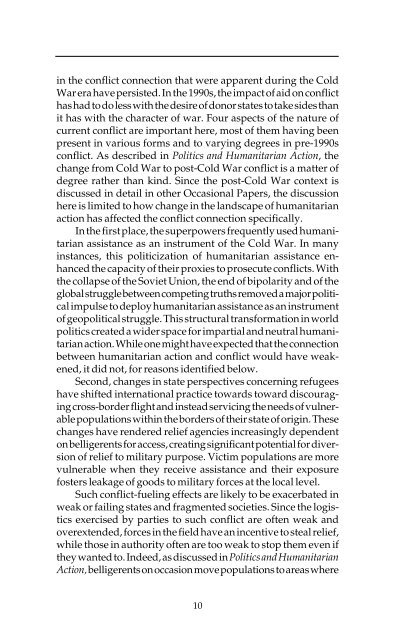Brown Cover OP 43 - The Watson Institute for International Studies
Brown Cover OP 43 - The Watson Institute for International Studies
Brown Cover OP 43 - The Watson Institute for International Studies
You also want an ePaper? Increase the reach of your titles
YUMPU automatically turns print PDFs into web optimized ePapers that Google loves.
in the conflict connection that were apparent during the Cold<br />
War era have persisted. In the 1990s, the impact of aid on conflict<br />
has had to do less with the desire of donor states to take sides than<br />
it has with the character of war. Four aspects of the nature of<br />
current conflict are important here, most of them having been<br />
present in various <strong>for</strong>ms and to varying degrees in pre-1990s<br />
conflict. As described in Politics and Humanitarian Action, the<br />
change from Cold War to post-Cold War conflict is a matter of<br />
degree rather than kind. Since the post-Cold War context is<br />
discussed in detail in other Occasional Papers, the discussion<br />
here is limited to how change in the landscape of humanitarian<br />
action has affected the conflict connection specifically.<br />
In the first place, the superpowers frequently used humanitarian<br />
assistance as an instrument of the Cold War. In many<br />
instances, this politicization of humanitarian assistance enhanced<br />
the capacity of their proxies to prosecute conflicts. With<br />
the collapse of the Soviet Union, the end of bipolarity and of the<br />
global struggle between competing truths removed a major political<br />
impulse to deploy humanitarian assistance as an instrument<br />
of geopolitical struggle. This structural trans<strong>for</strong>mation in world<br />
politics created a wider space <strong>for</strong> impartial and neutral humanitarian<br />
action. While one might have expected that the connection<br />
between humanitarian action and conflict would have weakened,<br />
it did not, <strong>for</strong> reasons identified below.<br />
Second, changes in state perspectives concerning refugees<br />
have shifted international practice towards toward discouraging<br />
cross-border flight and instead servicing the needs of vulnerable<br />
populations within the borders of their state of origin. <strong>The</strong>se<br />
changes have rendered relief agencies increasingly dependent<br />
on belligerents <strong>for</strong> access, creating significant potential <strong>for</strong> diversion<br />
of relief to military purpose. Victim populations are more<br />
vulnerable when they receive assistance and their exposure<br />
fosters leakage of goods to military <strong>for</strong>ces at the local level.<br />
Such conflict-fueling effects are likely to be exacerbated in<br />
weak or failing states and fragmented societies. Since the logistics<br />
exercised by parties to such conflict are often weak and<br />
overextended, <strong>for</strong>ces in the field have an incentive to steal relief,<br />
while those in authority often are too weak to stop them even if<br />
they wanted to. Indeed, as discussed in Politics and Humanitarian<br />
Action, belligerents on occasion move populations to areas where<br />
10

















